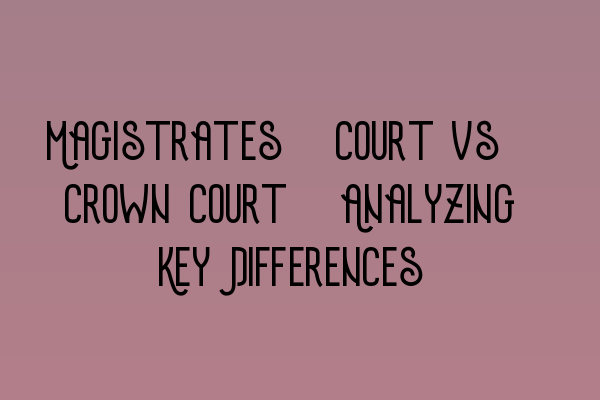Magistrates’ Court vs. Crown Court: Analyzing Key Differences
When it comes to criminal law proceedings in the United Kingdom, two key institutions play a crucial role in delivering justice: Magistrates’ Court and Crown Court. Understanding the differences between these courts is essential for defendants, solicitors, and legal professionals alike.
Overview of Magistrates’ Court
Magistrates’ Court is the lower court in the UK criminal justice system. It deals with less serious criminal offenses, such as minor traffic offenses, petty theft, and public order offenses. The court is presided over by a panel of justices of the peace, also known as magistrates, who are trained volunteers in the legal field.
Due to its informal nature, Magistrates’ Court offers a relatively quick and straightforward process. Defendants do not have the right to a jury trial in this court, as cases are decided solely by the magistrates. However, they can choose to have their case heard in Crown Court if they wish for a jury trial or face more serious charges.
Magistrates’ Court is known for its accessibility, as it handles a large volume of cases and operates in local communities. This enables defendants and victims to attend proceedings without significant travel expenses and facilitates faster resolution of cases.
Insights into Crown Court
Crown Court, on the other hand, is a higher court that deals with serious criminal cases. These can include offenses such as murder, rape, robbery, and drug trafficking. Crown Court proceedings are overseen by a judge, who is supported by a twelve-member jury responsible for deliberating the verdict.
Compared to Magistrates’ Court, the Crown Court offers a more formal and complex legal process. Defendants in Crown Court have the opportunity to be represented by a legal professional, such as a barrister or solicitor, who can build a robust defense strategy to vigorously challenge the prosecution’s case. The higher stakes involved also warrant a more comprehensive examination of evidence and legal arguments.
Additionally, Crown Court trials tend to be more time-consuming due to their complexity. Defendants and witnesses may need to dedicate more time and resources to participate fully in the proceedings. However, the gravity of the offenses and the need for a fair trial justifies these extended timelines.
Key Differences
Now, let’s summarize the key differences between Magistrates’ Court and Crown Court:
- Severity of offenses: Magistrates’ Court handles less serious offenses, while Crown Court deals with more serious criminal charges.
- Trial procedures: Magistrates’ Court has no jury trials and cases are handled by magistrates, while Crown Court has jury trials presided over by a judge.
- Accessibility: Magistrates’ Court is more accessible as it operates locally, while Crown Court proceedings are centralized in specific locations.
- Complexity: Crown Court trials are more complex and require legal representation due to the gravity of the charges involved.
Conclusion
In conclusion, understanding the differences between Magistrates’ Court and Crown Court is crucial for all individuals involved in the criminal justice system. While Magistrates’ Court handles less serious offenses in a more informal setting, Crown Court deals with more severe crimes through a formal and complex legal process.
Legal professionals, such as solicitors and barristers, must be well-versed in the nuances of each court to provide effective representation to their clients. Defendants must also be aware of the potential outcomes and procedures associated with the court where their case is being heard.
For further information and resources on the SQE exams and law practice preparation, please check out our related articles:
